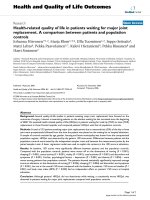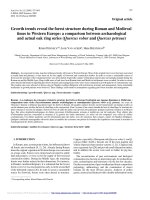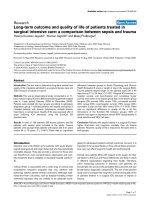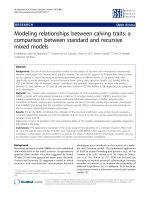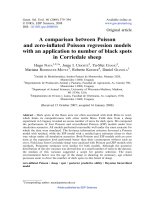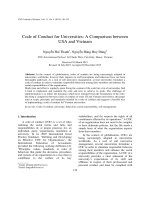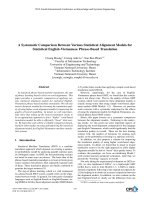Edited entrepreneurial personality a cultural comparison between finland and vietnam
Bạn đang xem bản rút gọn của tài liệu. Xem và tải ngay bản đầy đủ của tài liệu tại đây (69.74 KB, 10 trang )
ENTREPRENEURIAL PERSONALITY- A CULTURAL
COMPARISON BETWEEN FINLAND AND VIETNAM
TABLE OF CONTENTS
TABLE OF CONTENTS.................................................................................i
INTRODUCTION...........................................................................................1
DISCUSSION..................................................................................................2
I. LITERATURE REVIEW.......................................................................2
1.1. Entrepreneurship.............................................................................2
1.2. Entrepreneurial Personality............................................................2
II. Result Analysis.......................................................................................3
2.1. Culture affect and the concept of entrepreneurship.....................3
2.1.1. Culture affect entrepreneurship in Finland and Vietnam............3
2.1.2. The concept of entrepreneurship in the present..........................3
2.2. Entrepreneurial Personality............................................................4
2.2.1. Factors to become an entrepreneur..............................................4
2.2.2. The advantages and disadvantages of an entrepreneur...............5
2.2.3. Personality traits to become a successful entrepreneur...............5
CONCLUSION................................................................................................7
REFERENCES................................................................................................8
i
INTRODUCTION
There has been growing interest in studying the relationship between
entrepreneurial personality and culture in the past few decades since the effect
of cultural differences on entrepreneurial nature and activity varies from
country to country.
The primary purpose of this essay is to indicate the vital cultural
differences between Finland and Vietnam regarding entrepreneurial
personality. The main findings are to distinguish the influence of cultural
differences when practicing business in the country through cultural
comparison.
The entrepreneurial personality traits combine the characteristics,
abilities, motives, attitudes and values toward entrepreneurship by the
experiences and actions of each individual. According to Brandstätter (2011),
the personality characteristics of entrepreneurship are related to the
inclination towards entrepreneurial activities. Personality traits have a notable
influence on entrepreneurs due to the aspects of this profession with the
ability to choose and change the environment more often and actions
according to personal decisions and purposes. This implies that it is necessary
to study the cultural differences and how people perform entrepreneurial
activities.
1
DISCUSSION
I. LITERATURE REVIEW
1.1. Entrepreneurship
The concept of entrepreneurship has been discussed and defined by
various economists and written in different academic resources. The
definition of entrepreneurship or an entrepreneur depends on the creator's
perspective and which aspects or elements the researchers focus on.
According to Oxford's Dictionaries, entrepreneurship is the movement of
beginning or running organizations to acquire cash, implying facing monetary
challenges and the capacity to do this. The Merriam-Webster Dictionary
additionally characterizes a business visionary as an individual who "puts
together, oversees, and expects a business or endeavor".
1.2. Entrepreneurial Personality
The mid-20th century marked the research on entrepreneurial
personality traits from various perspectives such as psychology, sociology,
economics, and business management to answer the significant problems like
who an entrepreneur is and which motives and traits a businessperson has.
Successful entrepreneurs with the ownership of certain personality traits can
perform their jobs well. On the other hand, if certain personality traits are
absent, the shortage makes it more challenging for individuals to become
successful entrepreneurs. The personality characteristics and entrepreneurship
performance are connected. Several academic pieces of research have
supported this topic by Thal & Bedingfield (2010); Martin, Julius & Grace
(2016). Also, Slavec (2014) supported the view that personality traits can
predict entrepreneurial performance in the future.
2
II. Result Analysis
In this essay, the qualitative research method with semi-structured
interviews questions was used to collect the required data for the study aim.
This thesis topic is “Entrepreneurial personality- a cultural comparison
between Finland and Vietnam"; by the qualitative research method, argues
about meanings, attitudes and experiences from the given country, Vietnam
and Finland
2.1. Culture affect and the concept of entrepreneurship
2.1.1. Culture affect entrepreneurship in Finland and Vietnam
Both Finnish and Vietnamese respondents realized the critical role of
entrepreneurship in the economy. Entrepreneurship draws many certain
benefits such as improve productivity, supply to the market and financial
growth positively.
Finnish respondents regarded culture as a supportive circumstance that
influences entrepreneurship. The level of cultural influence altered from
company to company. On the other hand, Vietnamese respondents
acknowledged culture as an essential factor that affects entrepreneurship. The
attitudes and mindsets of Vietnamese people associated with traditional
cultural thinking are difficult to change or adapt to the evolving environments
flexibly. Due to status and priority order outcomes, relationship-oriented
business culture, and the solicit, entrepreneurs must consider the cultural
impact of Vietnam's global protocols and business cultures.
For example: Vietnamese entrepreneurs generally are less susceptible
to the ‘fear of failure’ mentality endemic in many countries’ startup culture.
Whether because of pride or necessity, many local entrepreneurs embrace the
unpredictability and volatility that comes with founding a company.
3
2.1.2. The concept of entrepreneurship in the present
The government in both nations also have distinct policies to promote
businesses. It is possible to receive financial support when starting a business
(startup money or start tirtha, particular loans to develop a company). In
Finland, entrepreneurs get help in places like Uusyrityskeskus, TE-toimisto,
Ely-keskus and Business Finland. The procedures to establish a business in
Finland do not have too much bureaucracy and lengthy formalities. Although
the government is supportive in Vietnam, there is a lack of specific
implementations and qualitative tools to support business. The initiatives are
still vulnerable in some perspectives, which leads to the lack of self-operation
and self-development in most micro-businesses.
The idea of entrepreneurship in Finland and Vietnam at present differs
from the one in the past. There are changes in attitude and the way to become
an entrepreneur. Nowadays, there are more laws and regulations to comply
with the Finnish government's authority and requirements. In Vietnam, the
market is expanding with more small and medium-sized enterprises, which
strongly increases the development of the entrepreneurship concept.
Nevertheless, lack of sustainable funding sources and capital, high taxes, high
labor costs more fabulous competitions lessen the stabilities of businesses in
Vietnam. In the future, Finnish and Vietnamese respondents discussed the
role of information technology that is more and more advanced, which will
generate new possible opportunities and develop the perspective towards
entrepreneurship and the mindsets, buying habits, and lifestyles.
2.2. Entrepreneurial Personality
2.2.1. Factors to become an entrepreneur
The primary factors to become an entrepreneur, according to most of
the responses, comes from the inside, like solid feeling that they would like to
do better and it should be done better, the firm will change the way of
4
thinking and life skills for women and children, the thirst for knowledge. Both
Finnish and Vietnamese respondents mentioned entrepreneurs' specific
characteristics, such as the strong will to lead, high energy, courage, vision,
sensitivity, and constant improvement.
For Finnish respondents, it is apparent to build a new business if
precise criteria are met (have a good network and know many people, learn
and get the products or services apparently). In terms of Vietnamese
respondents, it depends on the situation. The hard part is to self-fund, find
capital sources, and have the appropriate workforce, especially for small and
medium-sized businesses or industries that suffer from labor scarcity.
2.2.2. The advantages and disadvantages of an entrepreneur
Most of the respondents thought that freedom is the advantage of being
an entrepreneur. They will have their quality standards, manage their own
time and finance, proactively plan the development directions for the firm,
make their own decisions. Most Finnish and Vietnamese respondents agree
that the disadvantages of being a businessperson are uncertainty and risks.
They have to deal with all the dangers and stressful situations, take essential
duties, not be sure about everything and have sufficient time to recuperate and
family or hobbies.
For instance: Vietnam has cheap labor, the average salary of a worker
is just about 170- 250 USD in big cities, in the countryside is lower.
Population is young, hardworking, many are educated , ambitious.Vietnam is
developing fast, with 99 milions consumer it s becoming an interesting
market for international companies. But infrastructure is not developped. In
big cities people mostly use scooters as mean of transport thus the traffic is
horrible, the air is polluted. The laws regarding the business environement are
not complete, not clear, give room to interpretation and corruption.
5
2.2.3. Personality traits to become a successful entrepreneur
The Finnish respondents do not consider that experience is the answer
to make an entrepreneur successful. It is essential to acknowledge and
understand the products or services well to succeed as well as a
businessperson requires more than just experience to become successful. The
Vietnamese respondents that the key to making an entrepreneur successful is
wisdom, but it also associates with additional dimensions.
All responses felt that there are things for them to get more: stay open,
curious, believe in themselves and have the capacity to learn from everything,
social media and workshop knowledge, and communication and negotiation
skills. It is seen that entrepreneurs are open to changes and ready to learn new
things.
All respondents agreed that when a person considers setting up a new
business, they should think carefully and prepare (begin with what they are
good at; get all the information, help and advice needed, prepare a sufficient
amount of finance sources).
In general, the principal distinction between the Finnish and
Vietnamese respondents is the attitudes towards experiences. The Finnish
respondents do not think of experience as an essential factor that affects an
entrepreneur's success. In contrast, the Vietnamese respondents believe that
experience is a critical factor in making an entrepreneur victorious. The
Vietnamese respondents indicated experience as the solid framework to deal
with the market and the business model transformation. When the Finnish
respondents think that experience is to help entrepreneurs to stay locus on
purpose and will not fall hard on the first attempt.
6
CONCLUSION
In this essay, the author mainly aimed to describe the vital cultural
differentiates relating to the entrepreneurial traits through a cultural
comparison of Vietnam and Finland.
Based on the data from the interviews, both Finnish and Vietnamese
respondents agreed that successful entrepreneurs have certain personality
traits. Although Finnish respondents thought entrepreneurs are born, so
people have those traits from the start.
While Vietnamese respondents
thought entrepreneurs are made, so businesspeople possess those features
when practicing entrepreneurial actions. Those traits are Extraversion, Locus
of Control, Openness to Experience, Risk Attitudes.
The connection between cultures and entrepreneurial personality traits
in Vietnam and Finland exists. Depending on internal and external elements
and the features of each culture, entrepreneurs have or develop additional
personality traits besides the main personality traits that all cultures have.
Since Finland and Vietnam are situated in different sections of the
world, one a so-called Western nation and the other an Eastern country, the
number of differences outweigh the number of similarities. About the
differences, the Finnish culture scores low in Power Distance but high in
Individualism, high Uncertainty Avoidance, Long-Term standard Orientation
(normative culture), high Indulgence. In contrast, Vietnamese culture is high
Power Distance, low Individualist, low Uncertainty Avoidance, Long-Term
high Orientation and low Indulgence. When it comes to the similarities, both
countries are low Masculinity societies.
7
REFERENCES
1) Bolton W.K. & Thompson J.L. 2000. Entrepreneurs: Talent,
Temperament, Technique. Butterworth Heinemann, Oxford.
2) Chetty P. 2016. Cultural theories of entrepreneurship. Project Guru.
/>3) Corporate Finance Institute. What is the Hofstede's Cultural
Dimensions
Theory?
/>des-cultural-dimensions-theory/
4) Expert Program Management. Trompenaars Cultural Dimensions – The
6
Dimensions
of
Culture.
/>5) Grace J. & Dr Smith P. The importance of the cultural factor in
entrepreneurship.
Contemporary
Issues
in
urban
Australia.
/>MOC-CSA-The-Importance-of-Culture6) Dat Nguyen, 1 in 4 Vietnamese wants to be an entrepreneur, 2021,
/>7) The
power
of
Vietnamese
entrepreneurs,
/>
8
